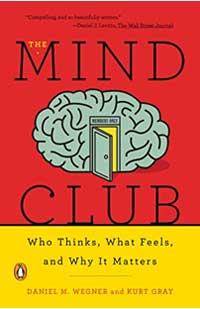 388 pages
388 pages10 CE credits
Course Enrollment
$220.00
Add to Cart
All exams are taken online. The exam for this course will be available in "My Courses" immediately upon enrollment. Note the book is not included.
The book is available for purchase from Amazon.
As an Amazon Associate we receive a rebate from qualifying purchases.
THE MIND CLUB
Who Thinks, What Feels, and Why It Matters
Daniel M. Wegner and Kurt GrayPenguin Books, 2016
DESCRIPTION
The minds of others are not directly available to us. We can infer what they are thinking based on speech and behavior, but we are never certain. When we consider what our boss or spouse is thinking, we are admitting them to the mind club. We are accepting that they have minds and try to figure out what they are thinking. When we wonder what our pet is thinking, we are admitting them to the mind club. Social psychology research on how people perceive and construct their models of how other minds work can help psychologists perceive, identify, and explain the mental processes and contents of their clients and research participants.
By investigating the mind perception of extraordinary targets–animals, machines, comatose people, god–Wegner and Gray explain what it means to have a mind, and why it matters so much. Fusing cutting-edge research and personal anecdotes, 'The Mind Club' explores the moral dimensions of mind perception with wit and compassion, revealing the surprisingly simple basis for what compels us to love and hate, to harm and to protect.
The reader will be able to:
• Demonstrate the authors' theory of mind perception called "cryptominds"
• Describe some examples of mind perception disorders
• Analyze how people construe their minds when describing their own perceptions
• Outline the roles of experience and agency in the two-dimensional perception of the mind
• Apply the idea of linking mind perception to dyadic morality
• Relate aspects of the perception of an animal's mind, machine mind, enemy mind and silent mind with the perception of the cryptomind
• Explain the Turing Test in examining a mind's perception
AUTHOR
Daniel M. Wegner was the John Lindsley Professor of Psychology in Memory of William James at Harvard University, and recipient of the 2011 Distinguished Scientific Contribution Award of the American Psychological Association, the 2011 William James Fellow Award of the Association for Psychological Science, and the 2011 Distinguished Scientist Award of the Experimental Social Psychology. He is the author of The Illusion of Conscious Will, among other books. He passed away in July 2013.
Kurt Gray is an assistant professor at the University of North Carolina, Chapel Hill, where he leads the Mind Perception and Morality Lab. He received his BSc from the University of Waterloo and his Ph.D. in social psychology from Harvard University. A recipient of the Janet Spence Award for Transformative Early Career Research from the Association for Psychological Science, he lives in Chapel Hill.
"Compelling, and so beautifully written... 'The Mind Club' deftly brings the most up-to-date research about other minds to readers of all backgrounds. It may cause you to think differently about crime and punishment, about business transactions and health care, and even about the upcoming elections. Things might just start looking up."
-- The Wall Street Journal
"According to psychologists Wegner and Gray, 'you can never be certain that other minds even exist.' The authors explore these uncertainties, weaving together personal anecdotes and research on human behavior and perception to try to unravel the mysteries of the mind."
-- Scientific American
ISHK CE at Home
1702-L Meridian Ave., #266
San Jose, CA 95125-5586
This website uses cookies to ensure you get the best experience on our website. Learn more
